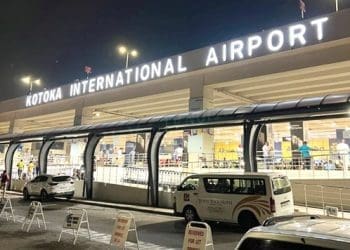More than 2,000 rounds of ammunition and 20 weapons were intercepted at Ghana’s premier airport, the Kotoka International Airport (KIA), in 2023 alone, highlighting a worrying gap in the country’s aviation security protocols.
A total of 2,077 rounds of ammunition and 20 weapons were discovered at two key passenger screening points.
Aviation Security (AVSEC) screeners intercepted 198 rounds and four weapons at the international passenger screening point, while an additional 1,879 rounds and 16 weapons were detected at Terminal 2’s passenger screening area.
The revelation, contained in the latest Report of the Auditor-General on the Public Accounts of Ghana: Public Boards, Corporations and Other Statutory Institutions for the period ended December 31, 2024, paints a disturbing picture of rising security threats at KIA amidst the absence of a national policy to regulate passengers carrying weapons through airports.
Scary development
Despite the seriousness of the seizures, all the passengers involved were allowed to board their flights.
The Auditor-General noted this was due to the lack of a national policy regulating the carriage of weapons by air travellers — a loophole that security experts say poses grave risks to passengers, crew, and airport personnel.
Potential threat to aviation safety
The interception of such a significant quantity of weapons and ammunition at KIA has triggered concerns over the safety of Ghana’s airspace.
Security analysts warn that the unchecked transport of arms on flights — even if declared — opens the door to incidents that could compromise in-flight and airport security.
The Auditor-General’s report calls the situation a “potential security risk,” stressing that the absence of a clear regulatory framework “increases the likelihood of unauthorised weapons being brought onto flights, posing a serious safety concern.”
To close the compliance gap, the Auditor-General recommended that the management of Ghana Airports Company Limited (GACL) develop and implement a comprehensive policy outlining strict guidelines and procedures for screening and handling passengers who carry weapons.
GACL flags regulatory delays
In response to the audit findings, GACL indicated that it had already raised alarms over the rising carriage of weapons through KIA. According to the company, the security threat was brought to the attention of the National Civil Aviation Security Committee (NCASC) as far back as 2022.
At the 2022 NCASC meeting, GACL formally presented the case and urged immediate redress.
The meeting, attended by the Ghana Civil Aviation Authority (GCAA) — the regulator of the industry — concluded that the lack of appropriate regulations and sanctions was the primary driver behind the surge in weapon carriage.
Following this, NCASC directed GCAA to enact regulations, including penalties, to curb the indiscriminate transport of weapons. However, more than a year later, no such policy had been implemented.
Faced with continued regulatory inaction, GACL wrote to GCAA again in August 2023, requesting swift promulgation of a Weapon Declaration Policy.
By November 2023, GACL escalated the matter to the Minister for National Security, seeking intervention on the movement of undeclared weapons and ammunition.
Despite assurances by GCAA — captured in the minutes of an NCASC meeting in October 2023 — that a policy on punitive measures would be introduced, GACL noted that no official document has yet been received.
Proactive measures amid policy vacuum
While awaiting a formal regulatory framework, GACL has taken internal steps to mitigate the threat.
AVSEC screeners have been resourced and retrained to enhance their ability to detect concealed weapons and ammunition at various checkpoints across the airport.
Officials say this effort has contributed significantly to the high detection numbers in 2023, but caution that without an enforceable national policy with sanctions, the problem is unlikely to be fully contained.
A national security imperative
Stakeholders in the aviation and security sectors are unanimous in calling for action.
The Auditor-General’s report underscored the need for a nationally enforceable framework that clearly defines acceptable conditions under which weapons may be transported by passengers, outlines declaration procedures, and enforces strict penalties for non-compliance.
Until such a policy is implemented, Ghana’s busiest airport — a hub for diplomatic, business, and commercial travel — remains vulnerable to the risks posed by the unauthorised and unregulated movement of arms.














